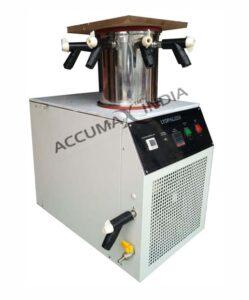- New Delhi,Janakpuri
- accumax105@gmail.com

Lyophilizer technical specifications
| Parameter | Table top | |||
| Chamber Capacity | 5 Liters | |||
| Capacity | To hold 5 Liters Semi Liquid Solution | |||
| Sample Holding | Sample should be in different flask more than 10 Nos. | |||
| Temperature | -30 deg C | |||
| Condensation capacity | 5 L in 24 hours | |||
| Compressor | 1/3 HP (hermetically sealed) Double Stage | |||
| Vacuum Pump | Suitable vacuum pump for above capacity | |||
| Vacuum gauge | Pirani gauges | |||
| Controller | PID | |||
| Temperature deviation | 0.5 deg C | |||
| Temperature sensor | PT-100 | |||
| Display | LED/LCD | |||
| Adjustable Alarm Limits (Visual & Acoustic) | Optional | |||
| Refrigerants | R 134 or R 404 | |||

Lyophilizer in Pharma manufacturing
Lyophilization has been used in many different research projects in the pharmaceutical industry. As has been mentioned, the process of lyophilisation provides excellent retention of the three-dimensional structures of biological samples, which aids in the accuracy of drug developmental research.
Allowing the drying of heat-sensitive drugs and biologicals at low temperature, it is mainly used to improve the stability and storage of labile drugs. Commonly applied to the production of injectable dosage forms of drugs, pharmaceutical freeze-drying is also used to produce diagnostics. Less commonly, it is used to produce solid oral dosage forms that require a very fast dissolution rate.
By removing water/solvent and sealing the product in a vial, the shelf-life of injectables and vaccines can be increased. Therefore, pharmaceutical companies can easily store, ship, and later reconstitute the material to its original form for injection.
Lyophilization can also be used as a purification process in the later stages of sample preparation, due to how effective this process is in removing solvent from a product.
The technique does have some limitations though, and not all research techniques can benefit from samples prepared in this way. For example, X-ray crystallographic studies require a pure crystal, and samples that have been freeze-dried (the sample must be dialyzed to remove buffers and salts that are still present that may cause undesirable effects on the crystal) are not suitable for this. Even though some proteins such as catalase are known to crystallize after lyophilization, the process is generally not suited to crystallographic studies. However, lyophilization remains one of the most reliable and widely used techniques for sample preparation in the pharmaceutical industry.

